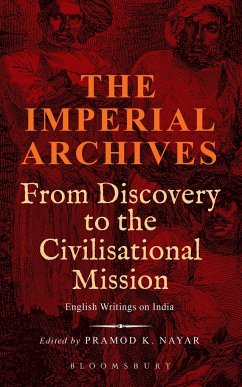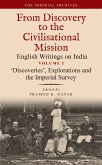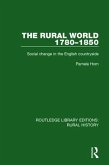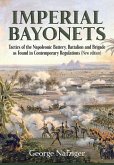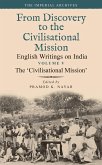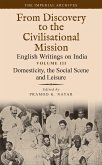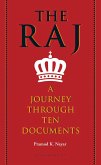The Imperial Archives
From Discovery to the Civilisational Mission: English Writings on India
Herausgeber: Nayar, Pramod K
The Imperial Archives
From Discovery to the Civilisational Mission: English Writings on India
Herausgeber: Nayar, Pramod K
- Gebundenes Buch
- Merkliste
- Auf die Merkliste
- Bewerten Bewerten
- Teilen
- Produkt teilen
- Produkterinnerung
- Produkterinnerung
India and the subcontinent stimulated the curiosity of the British who came to India as traders. Each aspect of life in India-its people, customs, geography, climate, flora and fauna-was documented by British travellers, traders, administrators and soldiers to make sense to the European mind. As they 'discovered' India and occupied it, they also attempted to 'civilise' the natives. The present volumes focus on select aspects of the imperial archives: the accounts of 'discovery' and exploration-flora and fauna, geography, climate; the people of the subcontinent; English domesticity and social…mehr
!['Discoveries', Explorations and the Imperial Survey 'Discoveries', Explorations and the Imperial Survey]() Pramod K Nayar'Discoveries', Explorations and the Imperial Survey128,99 €
Pramod K Nayar'Discoveries', Explorations and the Imperial Survey128,99 €![Voices in the Legal Archives in the French Colonial World Voices in the Legal Archives in the French Colonial World]() Voices in the Legal Archives in the French Colonial World180,99 €
Voices in the Legal Archives in the French Colonial World180,99 €![The Rural World 1780-1850 The Rural World 1780-1850]() Pamela HornThe Rural World 1780-1850159,99 €
Pamela HornThe Rural World 1780-1850159,99 €![Imperial Bayonets: Tactics of the Napoleonic Battery, Battalion and Brigade as Found in Contemporary Regulations (New Edition) Imperial Bayonets: Tactics of the Napoleonic Battery, Battalion and Brigade as Found in Contemporary Regulations (New Edition)]() George NafzigerImperial Bayonets: Tactics of the Napoleonic Battery, Battalion and Brigade as Found in Contemporary Regulations (New Edition)57,99 €
George NafzigerImperial Bayonets: Tactics of the Napoleonic Battery, Battalion and Brigade as Found in Contemporary Regulations (New Edition)57,99 €![The 'Civilisational Mission' The 'Civilisational Mission']() Pramod K NayarThe 'Civilisational Mission'128,99 €
Pramod K NayarThe 'Civilisational Mission'128,99 €![Domesticity, the Social Scene and Leisure Domesticity, the Social Scene and Leisure]() Pramod K NayarDomesticity, the Social Scene and Leisure128,99 €
Pramod K NayarDomesticity, the Social Scene and Leisure128,99 €![The Raj The Raj]() Pramod K NayarThe Raj128,99 €
Pramod K NayarThe Raj128,99 €-
-
-
- Produktdetails
- Verlag: Bloomsbury Academic
- Seitenzahl: 1754
- Erscheinungstermin: 28. März 2024
- Englisch
- Abmessung: 216mm x 135mm x 25mm
- Gewicht: 454g
- ISBN-13: 9789356408876
- ISBN-10: 9356408874
- Artikelnr.: 69977652
- Verlag: Bloomsbury Academic
- Seitenzahl: 1754
- Erscheinungstermin: 28. März 2024
- Englisch
- Abmessung: 216mm x 135mm x 25mm
- Gewicht: 454g
- ISBN-13: 9789356408876
- ISBN-10: 9356408874
- Artikelnr.: 69977652
Note General Introduction: Archive and Empire Introduction
Acknowledgements 1. Thomas Stephens. 'Letter'. 1579. In The First
Englishmen in India: Letters and Narratives by Sundry Elizabethans written
by Themselves, edited by J. Courtney Locke. London: George Routledge &
Sons, 1930. 2. Robert Barker. 'An Account of Some Thermometrical
Observations, Made by Sir Robert Barker, F. R. S. at Allahabad in the East
Indies, in Lat. 25° 30' N. during the Year 1767'. Philosophical
Transactions (1683-1775) 65 (1775). 3. James Rennell. 'An Account of the
Ganges and Burrampooter Rivers', communicated by Joseph Banks.
Philosophical Transactions of the Royal Society (1781). 4. William Jones.
'The Plants of India'. Asiatic Researches 2 (1807 [1787]). 5. William
Chambers. 'Some account of the Sculptures and Ruins at Mavalipuram'.
Asiatic Researches 1 (1788). 6. John Forbes Royle. Illustrations of the
Botany of the Himalayan Mountains. London: WH Allen, 1839. 7. Henry
Piddington. 'Fifth Memoir. Madras Hurricane of May 1841'. Journal of the
Asiatic Society of Bengal 11 (1842). 8. John Goldingham. 'The Great
Trigonometrical Survey of India'. The Calcutta Review 38 (1863). 9.
Alexander Cunningham. The Stupa of Bharhut. London: WH Allen, 1879. 10.
W.W. Hunter. 'Chilka Lake'. The Imperial Gazetteer of India. London:
Trübner and Co., 1885. Vol. III. 415-417. 11. C.S. Middlemiss. "Preliminary
Account of the Kangra Earthquake of 4 April 1905". Records of the
Geological Survey of India. London: Kegan Paul, Trench, Trübner & Co.,
1905. Vol. XXXII. 258-271. About the Editor Volume 2, Indian People and
Society Prefatory Note General Introduction: Archive and Empire
Introduction Acknowledgements 1. Thomas Roe. The Embassy of Sir Thomas Roe
to India, 1615-19, as Narrated in his Journal and Correspondence, edited by
William Foster. London: Oxford University Press, Humphrey Milford, 1926. 2.
John Fryer. [On fakirs] A New Account of East-India and Persia. London:
R.I. Chiswell, 1698. 3. Henry Colebrooke. 'On the Sanscrit and Prakrit
Languages'. Asiatic Researches 7 (1803). 4. John Borthwick Gilchrist.
'Preface'. The Strangers' East Indian Guide to the Hindoostanee; or Grand
Popular Language of India. London: W. Bulmer, 1808. 5. Fanny Parkes.
[Account of a suttee] Wanderings of a Pilgrim in Search of the Picturesque
during Four-and-Twenty Years in the East. London: Pelham Richardson, 1850.
2 vols. 6. John William Kaye. [Female Infanticide] Administration of the
East India Company. London: R. Bentley, 1853. 7. Talboys Wheeler. The
history of the imperial assemblage at Delhi, held on the 1st January, 1877,
to celebrate the assumption of the title of Empress of India by Her Majesty
the Queen. Including historical sketches of India and her princes past and
present. London: Longmans, Green, Reader, and Dyer, 1877. 8. W.H. Sleeman.
'Thugs and Poisoners'. Rambles and Recollections of an Indian Official.
Westminster: A. Constable and Co., 1893. 9. W.H.R. Rivers. 'Introduction'.
The Todas. London: Macmillan, 1906. 10. H.H. Risley and E.A. Gait.
'Introduction'. The Census of India, 1901. Calcutta: Office of
Superintendent of Government Printing, 1903. 11. Herbert Risley. 'Social
Types'. The People of India. Calcutta: Thacker, Spink & Co., 1908. About
the Editor Volume 3, Domesticity, the Social Scene and Leisure Prefatory
Note General Introduction: Archive and Empire Introduction
Acknowledgements 1. Thomas Williamson. Oriental Field Sports. London: W.
Bulmer, 1808. 2 vols. 2. John Malcolm. 'Notes of Instructions to Assistants
and Officers Acting under the Orders of Major-General Sir John Malcolm,
GCB'. In A Memoir of Central India, edited by John Malcolm. London:
Kingsbury, Parbury and Allen, 1823. Vol. 2. 3. J. Frederick Pogson. Indian
Gardening. Calcutta: Wyman, 1872. 4. Flora Annie Steel and Grace Gardiner.
The Complete Indian Housekeeper and Cook. London: William Heineman, 1909.
5. G.F. Atkinson. Curry and Rice, on forty plates; or the ingredients of
social life at "our station" in India. London: W. Thacker, 1911. 6. Maud
Diver. The Englishwoman in India. London: William Blackwood, 1909. 7. E.P.
Stebbing. The Diary of a Sportsman Naturalist in India. London: John Lane
and the Bodley Head, 1920. 8. Edward John Buck. Simla Past and Present.
Bombay: Times Press, 1925. About the Editor Volume 4, Rebellions and Wars
Prefatory Note General Introduction: Archive and Empire Introduction
Acknowledgements 1. J.Z. Holwell. A Genuine Narrative of the Deplorable
Deaths of the English Gentlemen and others who were suffocated in
Fort-William, at Calcutta, in the Kingdom of Bengal, in the night
succeeding the 20th day of June, 1756, in a letter to a friend. London:
Printed for A. Millar in the Strand, 1758. 2. James Bristow. A Narrative of
the Sufferings of James Bristow belonging to the Bengal Artillery during
Ten Years Captivity with Hyder Ali and Tippoo Saheb. London: John Murray,
1793. 3. 'Koregaon Battle'. Gazetteer of the Bombay Presidency 18, part 3.
Bombay: Government Central Press, 1885. 4. Julia Inglis. The Siege of
Lucknow: A Diary. London: James R. Osgood, McIlvine, 1895. About the Editor
Volume 5, The 'Civilisational Mission' Prefatory Note General Introduction:
Archive and Empire Introduction Acknowledgements 1. T.B. Macaulay. 'Minute
on English Education, 2nd February 1835'. In Selections from Educational
Records Part I, 1781-1839, edited by H. Sharp. Calcutta: Government
Printing, 1920. 2. Claudius Buchanan. An Apology for Promoting Christianity
in India. London: T. Cadell and W. Davies, 1813. 3. Alexander Duff. India,
and India Missions. Edinburgh: J. Johnstone, 1839. 4. Priscilla Chapman.
Hindoo Female Education. London: R.B. Seeley and W. Burnside, 1839. 5.
Irene Barnes. Between Life and Death: The Story of C.E.Z.M.S. Medical
Missions in India, China, and Ceylon. London: Marshall Brothers, 1901. 6.
W.S. Caine. 'The Temperance Problem in India'. In Indian Social Reform,
edited by C. Yajnesvara Chintamani. Madras: Thompson and Co., 1901. 87-97.
7. John W.D. Megaw. 'The Public Health Activities of the Government of
India'. In Social Service in India: An Introduction to Some Social and
Economic Problems of the Indian People, edited by Edward Blunt. London: His
Majesty's Stationer's Office, 1938. 191-194. 8. C.F. Strickland. 'Voluntary
Effort and Social Welfare.' In Social Service in India: An Introduction to
Some Social and Economic Problems of the Indian People, edited by Edward
Blunt. London: His Majesty's Stationer's Office, 1938. 380-398. About the
Editor Volume 6, Thugs and Dacoits Prefatory Note General Introduction:
Archive and Empire Introduction Acknowledgements 1. J. Shakespeare.
'Observations Regarding Badheks and T'hegs.' Asiatic Researches 13 (1820):
282-292. 2. [Doctor] Sherwood. 'Of the Murderers Called Phansigars' [1816].
Asiatic Researches 13 (1820): 250-282. 3. W.H. Sleeman. Ramaseeana, or, A
Vocabulary of the Peculiar Language Used by the Thugs. Calcutta: GH
Huttmann, Military Orphan Press, 1836. 4. W.H. Sleeman. Thugs, or,
Phansigars of India. Philadelphia: Carey & Hart, 1839. 5. W.H. Sleeman.
Report on the Depredations Committed by the Thug Gangs of Upper and Central
India. Calcutta: GH Huttmann, Military Orphan Press, 1840. 6. J.A.R.
Stevenson. 'Some Account of the Phansigars, or Gang-Robbers and of the
Shudgarshids, or Tribes of Jugglers.' Journal of the Royal Asiatic Society
1 (1834): 280-283. 7. H.H. Spry. 'Some Accounts of the Gang Murderers of
Central India, Commonly Called Thugs; Accompanying the Skulls of Seven of
Them.' The Phrenological Journal and Miscellany 8 (March 1834): 511-524. 8.
Lt. Reynolds. 'On the Thugs.' The New Monthly Magazine 38 (1833): 277-287.
9. E. Thornton. Illustrations of the History and Practices of the Thugs and
Notices of Some of the Proceedings of the Government of India for the
Suppression of the Crime of Thuggee. London: W.H. Allen, 1837. 10. 'The
Thugs; or, Secret Murderers of India', Review of Ramaseeana, by W.H.
Sleeman, The Edinburgh Review, or Critical Journal 64 (January 1837):
357-395. 11. Review of Ramaseeana, by W.H. Sleeman, The Foreign Quarterly
Review 21 (April 1838): 1-32. 12. F. Hollick. Murder Made Moral; or, An
Account of the Thugs, and Other Secret Murderers of India. Manchester: A.
Heywood, 1840. 13. Edward P. Eddrup. The Thugs; or, Secret Murderers of
India. London: Society for Promoting Christian Knowledge, 1853. 14. John
William Kaye. The Administration of the East India Company. London: Richard
Bentley, 1853. 2nd ed. 15. Selections from the Records of the Government of
India (Foreign Department). No XXIV. Calcutta: John Gray, 'Calcutta
Gazette' Office, 1858. 16. Charles Hervey. Report on the Crime of Thuggee
by Means of Poisons in British Territory for the Years 1864, 1865, and 1866
. Delhi: General Superintendent's Office Press, 1868. 17. E.J. Gunthorpe.
Notes on the Criminal Tribes Residing In, or Frequenting the Bombay
Presidency, Berar, and the Central Provinces. Bombay: Times of India Steam
Press, 1882. About the Editor
Note General Introduction: Archive and Empire Introduction
Acknowledgements 1. Thomas Stephens. 'Letter'. 1579. In The First
Englishmen in India: Letters and Narratives by Sundry Elizabethans written
by Themselves, edited by J. Courtney Locke. London: George Routledge &
Sons, 1930. 2. Robert Barker. 'An Account of Some Thermometrical
Observations, Made by Sir Robert Barker, F. R. S. at Allahabad in the East
Indies, in Lat. 25° 30' N. during the Year 1767'. Philosophical
Transactions (1683-1775) 65 (1775). 3. James Rennell. 'An Account of the
Ganges and Burrampooter Rivers', communicated by Joseph Banks.
Philosophical Transactions of the Royal Society (1781). 4. William Jones.
'The Plants of India'. Asiatic Researches 2 (1807 [1787]). 5. William
Chambers. 'Some account of the Sculptures and Ruins at Mavalipuram'.
Asiatic Researches 1 (1788). 6. John Forbes Royle. Illustrations of the
Botany of the Himalayan Mountains. London: WH Allen, 1839. 7. Henry
Piddington. 'Fifth Memoir. Madras Hurricane of May 1841'. Journal of the
Asiatic Society of Bengal 11 (1842). 8. John Goldingham. 'The Great
Trigonometrical Survey of India'. The Calcutta Review 38 (1863). 9.
Alexander Cunningham. The Stupa of Bharhut. London: WH Allen, 1879. 10.
W.W. Hunter. 'Chilka Lake'. The Imperial Gazetteer of India. London:
Trübner and Co., 1885. Vol. III. 415-417. 11. C.S. Middlemiss. "Preliminary
Account of the Kangra Earthquake of 4 April 1905". Records of the
Geological Survey of India. London: Kegan Paul, Trench, Trübner & Co.,
1905. Vol. XXXII. 258-271. About the Editor Volume 2, Indian People and
Society Prefatory Note General Introduction: Archive and Empire
Introduction Acknowledgements 1. Thomas Roe. The Embassy of Sir Thomas Roe
to India, 1615-19, as Narrated in his Journal and Correspondence, edited by
William Foster. London: Oxford University Press, Humphrey Milford, 1926. 2.
John Fryer. [On fakirs] A New Account of East-India and Persia. London:
R.I. Chiswell, 1698. 3. Henry Colebrooke. 'On the Sanscrit and Prakrit
Languages'. Asiatic Researches 7 (1803). 4. John Borthwick Gilchrist.
'Preface'. The Strangers' East Indian Guide to the Hindoostanee; or Grand
Popular Language of India. London: W. Bulmer, 1808. 5. Fanny Parkes.
[Account of a suttee] Wanderings of a Pilgrim in Search of the Picturesque
during Four-and-Twenty Years in the East. London: Pelham Richardson, 1850.
2 vols. 6. John William Kaye. [Female Infanticide] Administration of the
East India Company. London: R. Bentley, 1853. 7. Talboys Wheeler. The
history of the imperial assemblage at Delhi, held on the 1st January, 1877,
to celebrate the assumption of the title of Empress of India by Her Majesty
the Queen. Including historical sketches of India and her princes past and
present. London: Longmans, Green, Reader, and Dyer, 1877. 8. W.H. Sleeman.
'Thugs and Poisoners'. Rambles and Recollections of an Indian Official.
Westminster: A. Constable and Co., 1893. 9. W.H.R. Rivers. 'Introduction'.
The Todas. London: Macmillan, 1906. 10. H.H. Risley and E.A. Gait.
'Introduction'. The Census of India, 1901. Calcutta: Office of
Superintendent of Government Printing, 1903. 11. Herbert Risley. 'Social
Types'. The People of India. Calcutta: Thacker, Spink & Co., 1908. About
the Editor Volume 3, Domesticity, the Social Scene and Leisure Prefatory
Note General Introduction: Archive and Empire Introduction
Acknowledgements 1. Thomas Williamson. Oriental Field Sports. London: W.
Bulmer, 1808. 2 vols. 2. John Malcolm. 'Notes of Instructions to Assistants
and Officers Acting under the Orders of Major-General Sir John Malcolm,
GCB'. In A Memoir of Central India, edited by John Malcolm. London:
Kingsbury, Parbury and Allen, 1823. Vol. 2. 3. J. Frederick Pogson. Indian
Gardening. Calcutta: Wyman, 1872. 4. Flora Annie Steel and Grace Gardiner.
The Complete Indian Housekeeper and Cook. London: William Heineman, 1909.
5. G.F. Atkinson. Curry and Rice, on forty plates; or the ingredients of
social life at "our station" in India. London: W. Thacker, 1911. 6. Maud
Diver. The Englishwoman in India. London: William Blackwood, 1909. 7. E.P.
Stebbing. The Diary of a Sportsman Naturalist in India. London: John Lane
and the Bodley Head, 1920. 8. Edward John Buck. Simla Past and Present.
Bombay: Times Press, 1925. About the Editor Volume 4, Rebellions and Wars
Prefatory Note General Introduction: Archive and Empire Introduction
Acknowledgements 1. J.Z. Holwell. A Genuine Narrative of the Deplorable
Deaths of the English Gentlemen and others who were suffocated in
Fort-William, at Calcutta, in the Kingdom of Bengal, in the night
succeeding the 20th day of June, 1756, in a letter to a friend. London:
Printed for A. Millar in the Strand, 1758. 2. James Bristow. A Narrative of
the Sufferings of James Bristow belonging to the Bengal Artillery during
Ten Years Captivity with Hyder Ali and Tippoo Saheb. London: John Murray,
1793. 3. 'Koregaon Battle'. Gazetteer of the Bombay Presidency 18, part 3.
Bombay: Government Central Press, 1885. 4. Julia Inglis. The Siege of
Lucknow: A Diary. London: James R. Osgood, McIlvine, 1895. About the Editor
Volume 5, The 'Civilisational Mission' Prefatory Note General Introduction:
Archive and Empire Introduction Acknowledgements 1. T.B. Macaulay. 'Minute
on English Education, 2nd February 1835'. In Selections from Educational
Records Part I, 1781-1839, edited by H. Sharp. Calcutta: Government
Printing, 1920. 2. Claudius Buchanan. An Apology for Promoting Christianity
in India. London: T. Cadell and W. Davies, 1813. 3. Alexander Duff. India,
and India Missions. Edinburgh: J. Johnstone, 1839. 4. Priscilla Chapman.
Hindoo Female Education. London: R.B. Seeley and W. Burnside, 1839. 5.
Irene Barnes. Between Life and Death: The Story of C.E.Z.M.S. Medical
Missions in India, China, and Ceylon. London: Marshall Brothers, 1901. 6.
W.S. Caine. 'The Temperance Problem in India'. In Indian Social Reform,
edited by C. Yajnesvara Chintamani. Madras: Thompson and Co., 1901. 87-97.
7. John W.D. Megaw. 'The Public Health Activities of the Government of
India'. In Social Service in India: An Introduction to Some Social and
Economic Problems of the Indian People, edited by Edward Blunt. London: His
Majesty's Stationer's Office, 1938. 191-194. 8. C.F. Strickland. 'Voluntary
Effort and Social Welfare.' In Social Service in India: An Introduction to
Some Social and Economic Problems of the Indian People, edited by Edward
Blunt. London: His Majesty's Stationer's Office, 1938. 380-398. About the
Editor Volume 6, Thugs and Dacoits Prefatory Note General Introduction:
Archive and Empire Introduction Acknowledgements 1. J. Shakespeare.
'Observations Regarding Badheks and T'hegs.' Asiatic Researches 13 (1820):
282-292. 2. [Doctor] Sherwood. 'Of the Murderers Called Phansigars' [1816].
Asiatic Researches 13 (1820): 250-282. 3. W.H. Sleeman. Ramaseeana, or, A
Vocabulary of the Peculiar Language Used by the Thugs. Calcutta: GH
Huttmann, Military Orphan Press, 1836. 4. W.H. Sleeman. Thugs, or,
Phansigars of India. Philadelphia: Carey & Hart, 1839. 5. W.H. Sleeman.
Report on the Depredations Committed by the Thug Gangs of Upper and Central
India. Calcutta: GH Huttmann, Military Orphan Press, 1840. 6. J.A.R.
Stevenson. 'Some Account of the Phansigars, or Gang-Robbers and of the
Shudgarshids, or Tribes of Jugglers.' Journal of the Royal Asiatic Society
1 (1834): 280-283. 7. H.H. Spry. 'Some Accounts of the Gang Murderers of
Central India, Commonly Called Thugs; Accompanying the Skulls of Seven of
Them.' The Phrenological Journal and Miscellany 8 (March 1834): 511-524. 8.
Lt. Reynolds. 'On the Thugs.' The New Monthly Magazine 38 (1833): 277-287.
9. E. Thornton. Illustrations of the History and Practices of the Thugs and
Notices of Some of the Proceedings of the Government of India for the
Suppression of the Crime of Thuggee. London: W.H. Allen, 1837. 10. 'The
Thugs; or, Secret Murderers of India', Review of Ramaseeana, by W.H.
Sleeman, The Edinburgh Review, or Critical Journal 64 (January 1837):
357-395. 11. Review of Ramaseeana, by W.H. Sleeman, The Foreign Quarterly
Review 21 (April 1838): 1-32. 12. F. Hollick. Murder Made Moral; or, An
Account of the Thugs, and Other Secret Murderers of India. Manchester: A.
Heywood, 1840. 13. Edward P. Eddrup. The Thugs; or, Secret Murderers of
India. London: Society for Promoting Christian Knowledge, 1853. 14. John
William Kaye. The Administration of the East India Company. London: Richard
Bentley, 1853. 2nd ed. 15. Selections from the Records of the Government of
India (Foreign Department). No XXIV. Calcutta: John Gray, 'Calcutta
Gazette' Office, 1858. 16. Charles Hervey. Report on the Crime of Thuggee
by Means of Poisons in British Territory for the Years 1864, 1865, and 1866
. Delhi: General Superintendent's Office Press, 1868. 17. E.J. Gunthorpe.
Notes on the Criminal Tribes Residing In, or Frequenting the Bombay
Presidency, Berar, and the Central Provinces. Bombay: Times of India Steam
Press, 1882. About the Editor

